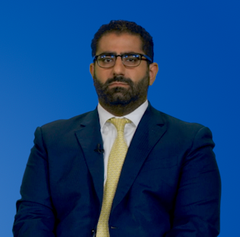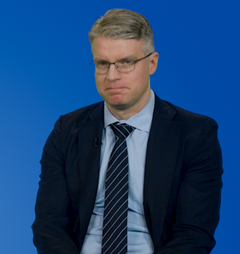
Supportive Care, Decision-Making, and Fatigue Management
Providers speak to the importance of encouraging patients to self-report adverse reactions and participate in shared decision making.
Episodes in this series

Mark Socinski, MD: From a supportive care point of view, what do you say to patients? What do you tell them about the do’s and don’ts of going on these treatments? Is there any specific information you want to make sure they understand?
Martin Dietrich, MD, PhD: I think one is that these pieces of information have to be relayed to the clinic very quickly. One of the challenges that we see with immunotherapy is that the timing, the occurrence, and the location of manifestation of the autoimmune [adverse] effects are completely variable, depending on the patient. We have no predictors where these will manifest, and we’ve had very good success in informing patients that [reporting adverse] effects will not preclude them from additional treatments… [they are] basically being deputized as an information source. And we’ve had very good success in our treatments. Oftentimes it was not necessarily autoimmune toxicity that gave us all the grief, but also the long exposure to steroids. And we’ve used the NCCN [National Comprehensive Cancer Network] guidelines very generously to use biologics and other adjunct medications to be steroid sparing, to shorten the time of treatments. And I think this has been a very successful model. We’ve had very good success with getting coverage from payers through the NCCN guidelines. I think it’s an important model. The question is, what’s the alternative? When I think about autoimmune and preexisting conditions, if I were to withhold treatment, what is it I’m offering them in return? And many patients who have autoimmune preexisting conditions do not worsen or just do not have these aggravating [adverse] effects. I think this is a risk-benefit scenario that, for most patients, lung cancer supersedes a capital medical problem.
Mark Socinski, MD: We like to embrace the concept of shared decision-making. And, you know, we try to get our patients to understand as best we can, but at the end of the day I find that patients rely on our expertise, our experience to tell them what to do. Like you, I say we need to know about anything that might happen. It doesn’t mean we’re going to change anything, but we ought to take measures to prevent a grade 1 or 2 [adverse effect from becoming] grade 3 or 4, where it’s a much bigger deal from a management point of view. But this is a shared decision-making. How does that work in your world?
Martin Dietrich, MD, PhD: It’s very challenging. I think the complexity and the unpredictable nature make this discussion very, very vague often, and very difficult for a patient to have a full understanding of what could happen. The plethora of [adverse] effects that can happen on autoimmune toxicity is too vast to cover in any reasonable discussion and too vast for any patient to retain. And so I do think it’s a little bit of a best-effort attempt to involve patients in shared decision-making, especially in the lung cancer population. Many of these patients are older and sometimes there are just very practical obstacles, such as hearing impairments. It’s not so easy to not guide this with a physician-centric kind of decision-making process. I think most patients are pretty forgiving that we can’t cover all of the [adverse] effects. I’ve had very few [adverse] effects where the patient has understood that the immune system can manifest in many, many different ways. But I think it’s more important, and especially when we’re working with families and family members, to basically explain that this is our 1 best shot to improve long-term outcomes. I think that’s really a top priority for us.
Mark Socinski, MD: One of the most common [adverse] effects in the chemotherapy trials, in the IO [immunotherapy] trials…is the very nonspecific complaint of fatigue…. It’s very complex. It’s very difficult. We don’t have an easy button for fatigue. What are your thoughts about treatment-related fatigue?
Martin Dietrich, MD, PhD: It’s very difficult. I do think that one intervention is obviously checking the autoimmune axis. I think beyond TSH [thyroid stimulating hormone], I’m quite surprised how much pituitary dysfunction we see, how much of Addison disease manifestations we see in patients who were actually already on hospice and [might have been] able to recover with a little bit of cortisol if they had been seen in the right setting. Anemia is very, very impactful in patients. Think about the patient [who smoked and has lung cancer]. This is a phenotype of coronary artery disease, other cardiovascular conditions. So having a hemoglobin [level of] 11, which would fly under the radar in many clinical settings, can be very impactful on a patient’s ability to work. Obviously, we don’t transfuse in that setting, but it’s certainly a good explanation. Other than that, I think the most successful interventions are those that are nonpharmacologic. We’ve tried stimulants and other medications. That would be helpful. I always encourage physical activity as a way of changing brain chemistry and trying to enhance endorphins and help with fatigue. And it is a self-fulfilling prophecy of a patient who rests [when fatigued] to really create a worsening phenotype. And then de-escalation. I think one of the questions was how much chemotherapy would you give in the metastatic setting? I think we have not seen a lot of difference between the 2- and the 4-cycle regimens. I think there’s an exponential increase in toxicity, especially within older patients as we move toward 4 and 6 cycles. And this is a very difficult scenario. So fatigue is not an easy solution. I don’t know that other than getting active and some encouragement about opportunities…
Mark Socinski, MD: … I’m fortunate enough to have with me in clinic one of the palliative care nurse practitioners. I think [that] can be very helpful because the one thing we should also mention is that depression can sometimes manifest itself as fatigue….
Martin Dietrich, MD, PhD: Depression, pain, medication [adverse] effects, certainly all of those are important. Having palliative care is way too rare, but it’s certainly a wonderful adjunct service for patients to really improve quality of life. And I do have to say, if you go back, this is not new information, but early introduction of palliative care is one of the overall survival-improving factors in non–small cell lung cancer. So there should be a synchronous referral at the time of diagnosis.
Mark Socinski, MD: [There was a]Jennifer S. Temel study in the New England Journal of Medicine years ago [that looked at that]. Yes, a very important part of it.
Transcript is AI-generated and edited for clarity and readability.
Newsletter
Stay ahead of policy, cost, and value—subscribe to AJMC for expert insights at the intersection of clinical care and health economics.












